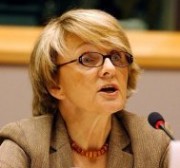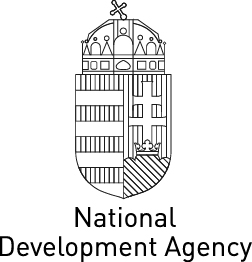Danuta Hübner Visits to Hungary17 June 2009
 Danuta Hübner EU Commissioner for Regional Policy paid a two-day visit to Hungary, within the framework of which the Commissioner visited several development projects implemented in rural regions with the help of EU funding.
Among others, Mr Marco Orani, Head of Unit Regio F5 (Hungary) of the Directorate-General for Regional Policy and Mr Jean-Marie Seyler Director of the Directorate-General for Regional Policy were members of the delegation accompanying the Commissioner.
Danuta Hübner EU Commissioner for Regional Policy paid a two-day visit to Hungary, within the framework of which the Commissioner visited several development projects implemented in rural regions with the help of EU funding.
Among others, Mr Marco Orani, Head of Unit Regio F5 (Hungary) of the Directorate-General for Regional Policy and Mr Jean-Marie Seyler Director of the Directorate-General for Regional Policy were members of the delegation accompanying the Commissioner.
This is Ms Danuta Hübner’s fifth visit to Hungary; during her two-day stay, the Commissioner visited several projects to be implemented in rural regions with the help of funding granted by the European Union.
From among these projects, the development implemented in Kistelek aimed at the direct use of geothermal energy was the first project the Commissioner visited. The hot water spring beneath the small settlement provides heat energy at a lower cost than energy produced from gas for eight public institutions, thanks to the development worth over half a billion HUF funded by the Environmental Protection and Infrastructure Operational Programme (EPIOP), which also serves as a good example for local governments thinking about setting up similar systems. The system operates according to modern standards, is cheap and environmentally friendly; the concerned institutions now spend 10% less on heating and pollution emission in the region has also decreased.
Following the visit to Kistelek, the Commissioner went on to visit investments taking place in Szeged, more specifically, she visited the József Attila Study and Information Centre where new medical software applications geared towards treating and curing tumour disorders more effectively are being developed. The General Electric Healthcare business division (GEHC) has launched a research project earmarked a total budget of 221 million HUF from its office in Szeged; two closely inter-linked software prototypes will be created as the outcome of this three-year project. One of the prototypes will help clinical research by making it possible to diagnose tumour disorders more accurately and plan and monitor treatment more effectively, hence improving the chances of recovering from tumour disorders. The other prototype is a software specifically developed for the liver that can be used for planning surgery, which, complemented by virtual surgery lesion, will represent progress in imaging the vascular system and tumours more effectively.
On the second day and as the first station of her visit to Pécs, Ms Danuta Hübner attended the official signing ceremony of the assistance contract of the project called "Adventure Tour in Baranya". A product group consisting of competitive tourist attractions may be created as an outcome of the project to be implemented with the help of EU funding amounting to nearly 1.8 billion HUF. Comprehensive tourism developments will be implemented in 4 settlements within the framework of this project. A forest bicycle trail over 20 kilometres long connecting Pécs, Orfű and Abaliget will be constructed; tourist attractions will be created by developing the renaissance estate in Bikal and investments tying in with the development of wine tourism will be implemented in Mecseknádas within the framework of the project called „Nestling Wine Village” by building on local wine cellars. The development of the recreational area adjacent to Lake Pécs in Orfű to European standards is currently taking place; a water tourism centre will be created, providing an opportunity to try out various water sports (such as kayak, canoeing, sailing or windsurfing) on the several hectare water surface of Lake Pécs. This tourism programme to be implemented with the help of EU funding, launched pursuant to the initiative of the local government and non-profit organisations and allocated the highest budget in Hungary will contribute to further building the tourism appeal of Baranya County. According to plans, this comprehensive tourism development to be implemented by 6 collaborating partners will create 135 new jobs in Baranya County by 2010.
As the next stop, the delegation was presented developments implemented in the South Trans-Danubian region at a special workshop organised for professionals and press conference, which Mr István Varga Minister for National Development and Economy and Dr Zsolt Páva Mayor of Pécs City of County Rank also attended. The Pécs 2010 European Capital of Culture (ECC) project was the special theme of the event. ECC investments running since 2008 mark the debut of the cultural development of the city and the region, which establishes the grounds for creating competitive sectors, as well as the long-term and balanced economic development of the region. The 2009-2010-period represents another milestone in the implementation of the South Trans-Danubian Action Plan, during which period it will be possible to invest further funding in the development of education and training; funding exceeding 10 billion HUF in value has been earmarked for the prioritised funding of the 8 most disadvantaged micro-regions integrated in the programme. Developments focus on strengthening the economy and increasing the level of employment.
During her two-day visit, Ms Danuta Hübner highlighted the following: on the basis of the use made of EU funding, Hungary ranks 6th among beneficiary member states. In the opinion of the Commissioner, Hungary implemented a highly ambitious programme during the 2004-2006 budgetary period and managed to fully use the funding made available; moreover, the Commissioner was also happy to see that Hungary is one of the member states requesting the highest rate of EU funding. During her visit, Ms Hübner commended the special programme targeting the development of the most disadvantaged settlements, which in her view ensures a good balance for implementing central and bottom-up initiatives.

